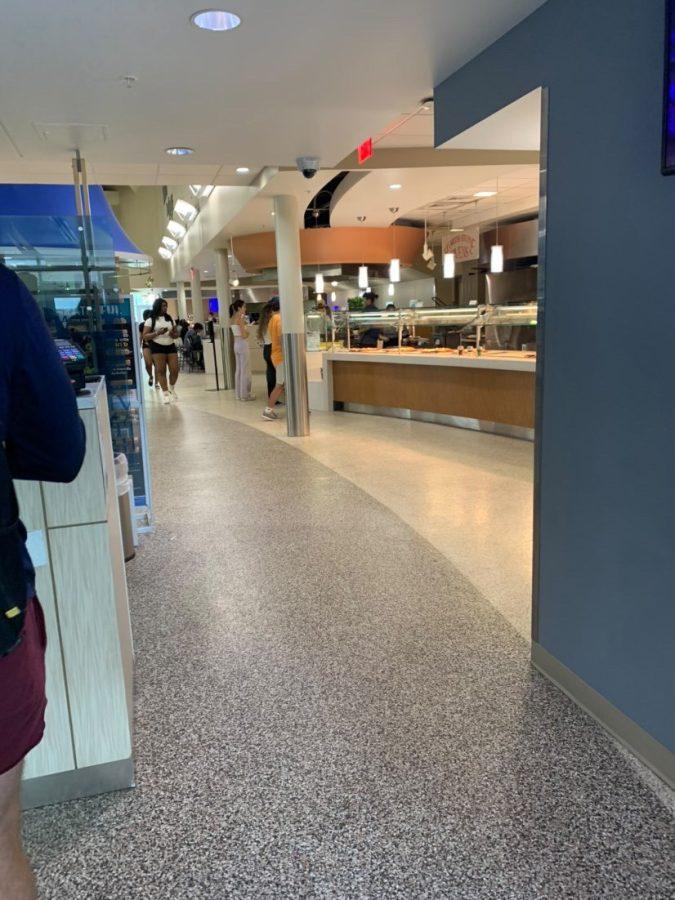Students adhering to dietary restrictions for spiritual purposes or because of allergies must approach foods with caution as it’s essential for preserving their morals or even their lives.
On-campus dining is no exception. The University of North Florida (UNF) has over ten dining locations that may tempt some students to push the limits of the “freshman 15,” while others meticulously investigate the ingredients and preparation of each dish before determining whether it’s something they can eat.
“Even though it’s possible for someone who’s eating kosher with negotiations to eat on campus… there are members of the Jewish community that it entirely prevents from eating on campus,” MacKenzie Reid, a UNF Jewish studies minor, said..
Reid follows a kosher diet and described kosher “negotiations” as a compromise between a philosophically kosher diet, which prevents things like the combination of dairy and meat, and a diet that sticks to kosher principles but is less strict about how the food is prepared.
Take a vegetable salad with cheese. It could be considered kosher but not if the cheese was touched by the same utensils that touched meat. The vegetables in the salad would need to be inspected for insects to be completely kosher and can not contain a trace of a non-kosher substance.
When it comes to religious dietary restrictions, individual interpretation of the rules determines what students of faith will eat. Muslim students may also find themselves negotiating what is halal or permissible to eat on campus.
“If something is slaughtered in the name of something other than Allah, then we can’t eat that because that’s the biggest sin,” explained Muslim Student Association (MSA) President Omar Aftab.

A kosher diet is more restrictive than Zabiha, which only restricts the land animal meat Muslims can consume. Zabiha meat must be slaughtered in the name of the Abrahamic God, allowing Muslims to eat vegetarian or kosher meals freely.
“Technically, we’re allowed to eat what Christians slaughter and we’re allowed to eat what Jews slaughter as well because it’s all the same God to us, but some of us prefer to avoid that,” Aftab explained. “I know a lot of Muslims that are like, OK, we can eat Chick-Fil-A because that’s a Christian store… but a lot of Muslims will prefer to avoid that because they might be slaughtering in the name of Jesus.”
Despite restrictions, most students can find foods that adhere to their religious guidelines. Reid found that a vegan diet helped him stick to his interpretation of kosher. Aftab says he generally follows a pescatarian diet when eating outside of his home or at a restaurant that he knows serves halal food.
“We’re different from these other people; we’re making this decision in our life,” Aftab explained.
For some students, dietary limitations are not a decision. For roughly 10.8% of US adults with food allergies, according to the Asthma and Allergy Foundation of America, campus dining can be a life-risking experience.
“Be aware that we handle and prepare egg, milk, wheat, shellfish, fish, soy, peanut and tree nut products, and other potential allergens in the food production areas in all of our facilities,” reads UNF Dining’s food allergy disclaimer.
“A Guide to Managing Food Allergies” is provided by UNF, telling students to inform campus dining of their allergies. Still, the variety of food options can be very limiting for students with allergies, especially if their allergic restrictions are coupled with religious ones.
Reid described how he does find food to eat on campus but has gone from being vegan to being vegetarian after living on-campus because his diet lacked variety.
“[Options] are definitely offered, but throughout the semester they can become [less] diverse. Like, when I was vegan, I would be eating, like, potatoes and spinach for breakfast every day every month,” said Reid.
Aftab explained that students in the MSA find permissible food at Chick-Fil-A, Panda Express and Einsteins. Finding food on campus is “not a big deal,” since he does not have any food allergies to worry about.
Both Aftab and Reid said they would like to see a more diverse selection of foods available on campus. Aftab believes students could benefit from a campus menu that encompasses food from more cultures.
For now, Aftab and Reid find ways to eat and adhere to their religions by cooking at home and with the help of clubs and organizations that they are a part of. Reid recommends kosher students visit the Ogier Gardens and the Chabad of South Side where students can enjoy a kosher dinner Friday nights. Aftab suggests that students who struggle to follow a Zabiha diet come to the MSA for the support of other Muslim students.
“When you make a kitchen kosher, you are also making it halal,” said Ried. “[UNF] would still essentially have to do one remodel to make the lives better for both of those bodies of students.”
___
For more information or news tips, or if you see an error in this story or have any compliments or concerns, contact editor@unfspinnaker.com.
















